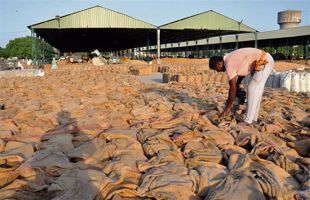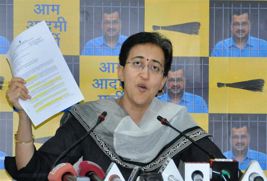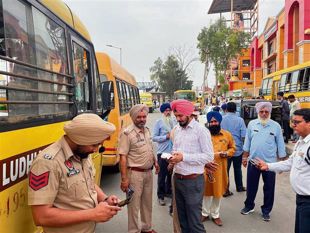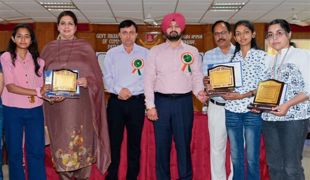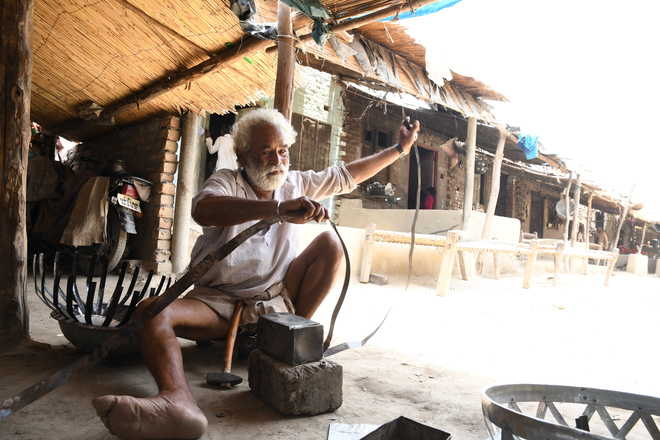
A farewell to arms: They once forged swords and made guns; now the Sikligars make iron baskets to survive
Sanjam Preet Singh
They are the abandoned children of history. Their skill has lost relevance in the face of modern technology. Reduced to penury, they live on the margins of the society. Meet Sikligar Sikhs, who once made weapons for the Khalsa.
Now, they make tokras (iron baskets), repair taslas (thick, iron circular shallow pan used in construction), and sharpen knives, scissors and agricultural implements. They roam in villages, selling knives, sickles, sieves, betel-nut cutters and locks.
In Dera Halwana village, Karnal, popularly known as Dera Sikligar, about 700 families of the tribe scrape a living doing odd jobs. Most of them are illiterate and lack access to social services. Ask them about their origins and they are clueless but they say their elders came from Pakistan and settled here.
Kirpal Kazak in his book, Sikligar Kabile Da Sabhyachar, says the history of the Sikligar tribe, in the context of Punjab, can be traced back to 1595-1644. That was the time when the sixth Sikh guru, Guru Hargobind, fought wars with the Mughals and espoused the concept of “Miri(temporal)-Piri (spiritual)”.
The story goes like this. The need for arms made Guru Hargobind look for artisans who could forge weapons. Kehar Singh was the first one to offer his services. Impressed with his skill, the guru ordered Kehar Singh to bring more Rajput ironsmiths, along with their families, from Marwar (now in Rajasthan) to Punjab.
These Marwar ironsmiths and their successive generations served Guru Hargobind and later Guru Gobind Singh. They were initiated into Sikhism. Impressed with their skill, Guru Gobind Singh named them Sikligar. The word Sikligar is derived from an Arabic word sikal which means an act of polishing weapons.
These Marwari ironsmiths not only repaired and polished weapons, but also fought at the front against the Mughals, writes Kazak. Today, they fight a different kind of battle. Considered low caste, they live in abject poverty in Dera Sikligar.
Mukhtiar Singh (38) is making a tokra outside his small one-room house with concrete walls and a thatched roof. He makes two to three pieces a day and sells each for Rs 100, barely earning Rs 30 after factoring in the input cost.
One of his two sons studied till Class VIII, free of cost, and then dropped out of school. “The books for Class IX will cost Rs 1,500. Besides, I cannot afford the school fee,” rues Mukhtiar. He cannot spend this much on one child. He has four more children to feed.
His elder brother, Prakash Singh, lives in the same lane. He works as a farm labourer and earns Rs 200 a day. As the agricultural work is seasonal, he remains without work for days.
Ask him about the history of Sikligars and he smiles and tries to duck the question. When you insist, he says, “I don’t know much. My elders told me that Sikligars made weapons for Guru Gobind Singh. Vichitar Singh, who served in the Guru’s army, was a Sikligar.”
Vichitar Singh’s tale is one which the Sikligars narrate with pride. When Pahari Rajas laid siege to the Anandpur Sahib fort and led an armoured elephant to break open the main door, Vichitar Singh with his spear faced the onslaught and defeated the Pahari Rajas, writes Kazak in his book.
Perhaps unaware of Vichitar Singh’s heroics, Jogi Singh (70) is repairing a tasla in a lane adjacent to Mukhtiar’s. Squatting on his haunches, he is hammering a round piece of iron.
None of his five sons have taken to this work. “They ask what have they gained from their legacy. They question me, ‘What did you do for us? Did you buy any property?’ What can I say? This is what my father taught me and his father taught him,” he says without any regret.
All his sons work as labourers — sometimes in fields and sometimes at construction sites. One of his granddaughters is eating a chapatti, dipping it into water. “We have one proper meal in a day,” Jogi’s son Jarnail Singh says. I wonder what his definition of a “proper meal” is. Is it what his daughter is having?
Such squalor 25 km from Karnal! But who’s bothered? The Haryana Government had, in 2015, announced housing facilities for the denotified tribes, including Sikligar Sikhs.
Some houses have been built, while construction of others has been held up for the want of government funds. A few villagers point to piles of bricks outside some houses, claiming that the grant is awaited to use these for construction. Though not all are so lucky to get the grant as several houses are kutcha.
The belongings in most houses, whether pucca or kuctha, remain more or less the same — a charpoy or two, a trunk for clothes, and a photo of the Nirankari guru. A few houses have a drum of grains (they get it in exchange for labour offered in the fields) and a television.
Sukhdev Singh and his family live in a shed-like house. They go on a pheri (round) to other states in search for work. They travel for four to five months, earning money from odd jobs and return to Dera Sikligar. “Our traditional job doesn’t fetch us enough money to eke out a living. So, we look for other avenues,” Sukhdev says. His wife and daughter are busy weaving a rope around a charpoy and his son sits nearby eating roti with tea.
Such is life here — and against all odds, they live on.
Descent into penury
During Maharaja Ranjit Singh’s rule, Sikligar Sikhs started making guns and rifles as well. These rifles were famous with the names of Toredar, Sada, Kotli, Pata and Churidar. Sikligars also forged khukris for the Gorkha regiment during the British rule. Later, the British banned weapon-making and the tribe was declared criminal.
The Partition sounded the death knell for the tribe’s skill. The final straw was when princely states were abolished.
For sustenance, they roamed in villages and started making small household items. They scattered to parts of Delhi, Punjab, Himachal Pradesh, Haryana, Rajasthan and Maharashtra.
Scattered living
In present times, the Sikligar tribe is divided into three groups, based on the work they do — those who live in cities make small weapons or run small businesses. Those who live in slums and villages make locks, keys and knives. The third are Tapriwas (nomad) Sikligars of Karnal’s Dera Sikligar village.





















